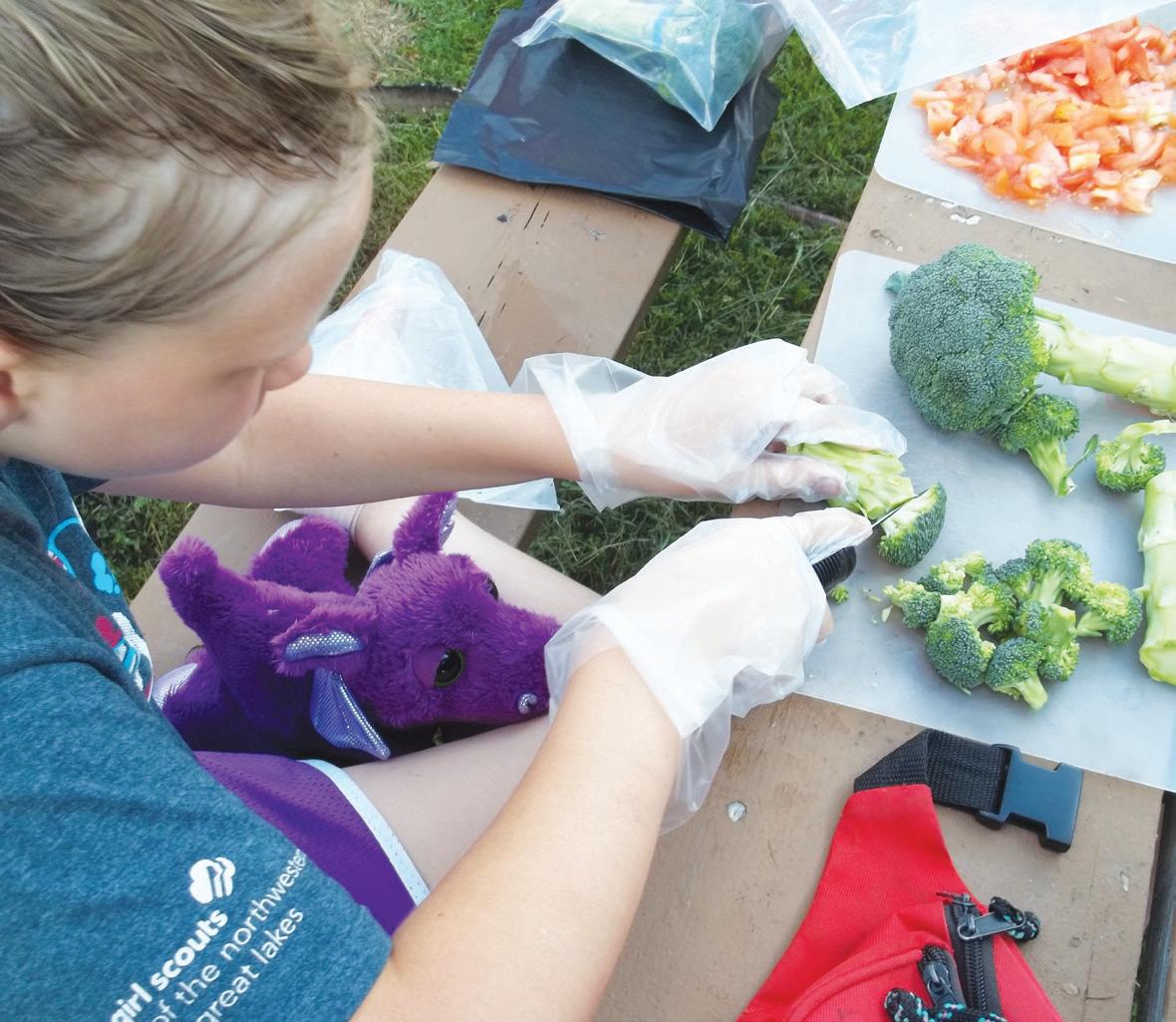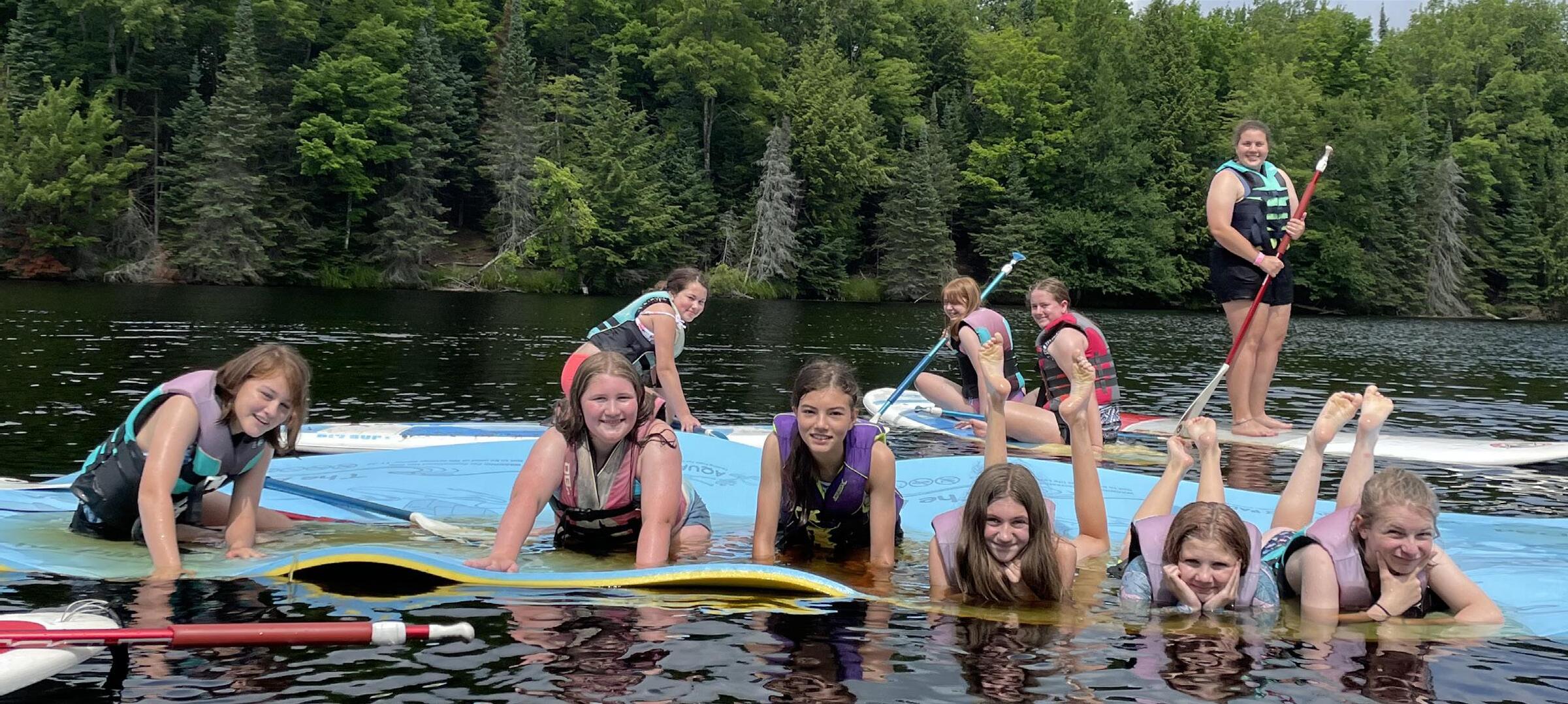
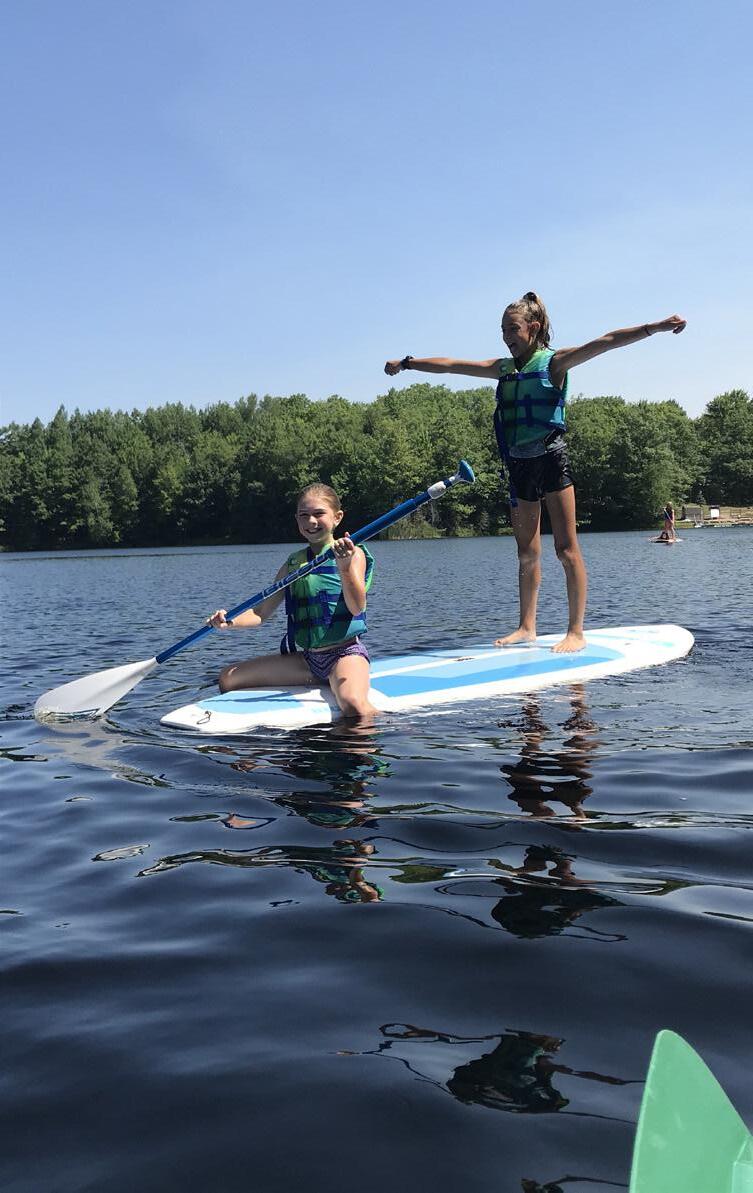





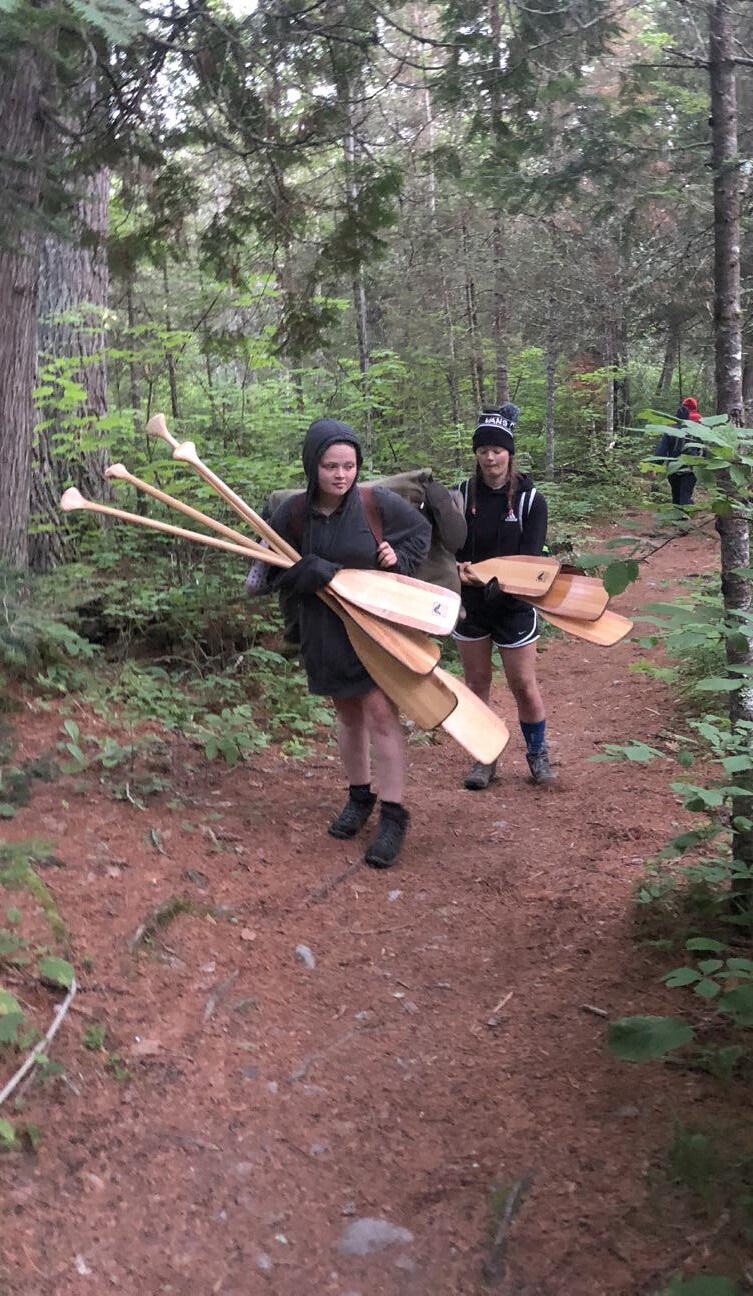
Girl Scouts love spending time outdoors, exploring new places, and making memories. Connecting with the great outdoors in a youthled setting is a big benefit of belonging to Girl Scouts. When a Girl Scout spends quality time outdoors and increases their exposure to nature, they:
• discover how they can better solve problems and overcome challenges,
• develop leadership skills, build social bonds, and are happier overall, and
• become team players and care more about protecting our environment.
Outdoor progression allows each Girl Scout to learn the skills they need to become competent outdoors, including planning and organizing outdoor activities at an age-appropriate and youth-led pace. Acknowledge a Girl Scout’s mastery of an outdoor skill and invite them to challenge themself further by taking the next step up and out! Use the Girl Outdoor Readiness Assessment to determine the most appropriate outdoor activities for your troop’s experience and skill level.
There are many ways for a Girl Scout to participate in an outdoor experience in Wisconsin and the Upper Peninsula of Michigan, from a day hike with their troop to a week at overnight camp!
Types of outdoor activities and programs may include:
• Simple activity in your neighborhood, such as an urban hike or visit to a local park.
• Troop activity to work on parts of an outdoor badge or Journey.
• A one-day troop field trip to go hiking, canoeing, horseback riding, rock climbing, or another special program—on your own or with a field trip and travel partner
• A weekend overnight tent camping trip, staying at a GSNWGL property or local campground.
• Staying in a cabin or lodge at a GSNWGL property.
• Attending a service unit or GSNWGL staff-led troop camp weekend.
• Planning a multi-day adventure at a higher skill level, such as a backpacking or multi-day rafting overnight trip.
• Attending a summer camp opportunity at Camp Birch Trails.
Girl Scout staff and volunteers are here to help! Our teams are happy to answer any questions and help plan outdoor activities. Please email us at info@gsnwgl.org.
Due to the higher required skill level and risk, some outdoor programs require additional approval from GSNWGL. Activities requiring additional approval are indicated in the ‘Prior Council Approval Required?’ section of the Safety Activity Checkpoints. You can request activity approval as soon as you know the details of your planned activity but no later than 30 days before the activity.
Make sure you are familiar with the GSNWGL Adult Volunteer Outdoor Trainings. Review the Council Trainings & Certifications opportunities for online and in-person training. Adults/leaders need to have completed GSNWGL outdoor training and have a certified First Aider. If it is a backcountry trip, then someone in your group must be certified in Wilderness First Aid. Groups participating in swimming or boating must stay within the ratio and have a certified lifeguard and a trained water watcher present. You may also reach out to your Service Area Outdoor Champion for local support. This person can help to train you in basic outdoor skills.
For more in-depth or higher-level outdoor skill training, such as preparing for a backpacking trip or wilderness survival, volunteers may be interested in guided trips or classes with another organization, like REI Outdoor Events.
Girl Scouts has a long history of getting kids outdoors to create adventure and develop a lifelong appreciation for nature. Whether you’re looking to explore your backyard or the backcountry, Girl Scout outdoor badges and Journeys will strengthen outdoor skills and ignite an interest in outdoor adventure and environmental stewardship.
• Refer to the Outdoor Progression Chart for a summary of progressive outdoor programming.
• Use the Badge Explorer to preview all outdoor badges and Journeys by program grade level.
• Working with a multi-level troop? Check the Badge & Award Chart for badges in the same outdoor content area.
• Troop leaders can use the Volunteer Toolkit to see suggested activity plans by badge.
In addition to working on outdoor badges and Journeys, there are opportunities for endless adventure and the challenge of discovering a new outdoor sport.
• Consult Safety Activity Checkpoints for your specific activity. Each activity includes sections with resources to learn more about the activity, required equipment, how to prepare your troop for the activity, safety guidelines, and more.
• Check out this excellent planner, too: Troop Campout Planner
• Also check out our outdoor cooking resources
• There’s also lots of great information on getting outdoors on our Volunteer Collective.
• To find a specific program vendor or location for an activity in Wisconsin/Michigan, browse sites like Wisconsin DNR OUTWIGO, Travel Wisconsin, or UP Travel. Make sure any potential partner meets Safety Activity Checkpoints requirements!
• Hiking is one of the most popular outdoor activities, and for good reason! When you are ready to find hikes farther out, we recommend AllTrails or Hiking Project. These can be found online or downloaded as apps on your phone. Click on the trail or area you are interested in for a detailed description, difficulty rating, mileage, elevation gain, and more.
• Badger Trails is another volunteer organization that sponsors different hikes throughout Wisconsin during the year. Contact them for more help in different areas of Wisconsin.
• North Country Trail
• Ice Age Trail
• Ready to plan a Take Action or Highest Award project? Contact your local state or regional park office to ask about upcoming volunteer opportunities or work with a ranger to develop your project.
• Looking for a bit of camp fun and silliness? Ultimate Camp Resource is a fantastic database with activity plans and resources for camp games (everything from nature games to large groups), camp songs, camp skits, team building, and even videos demonstrating how to run them!
There are many opportunities to join the camp and outdoor fun through a GSNWGL staff or volunteer-led program!
• Check out the GSNWGL Events & Activities page for upcoming outdoor activities and events open to troops or individual Girl Scouts.
• Sign up for summer camp! Girl Scouts of the Northwestern Great Lakes offers sleepaway camp sessions lasting three days to two weeks at Camp Birch Trails and staff-led full-weekend troop camps.
• Plan your program with an overnight at Camp Birch Trails, Camp Winnecomac, Camp Sacajawea, Camp Pow Low or Camp Del O’Claire, or the East or West Girl Scout Center, and book GSNWGL staff-led programming such as a guided nature hike, archery, or outdoor skills.
• Book a Facilitated Outdoor Experience with a GSNWGL staff member at a GSNWGL property.
• Book Adventures on the Go with a GSNWGL staff member at a location nearest you.
Participate in a patch program on your own or with your troop!
• Super Troop One Outdoor Outing
• There are several different patch programs your troop can participate in below:
• Girl Scout Tree Promise
• Girl Scouts Love the Outdoors
• Girl Scout Climate Challenge
• Girl Scouts Love State Parks
• Girl Scout Ranger Program
Are you ready to travel for an outdoor experience beyond a oneday local hike or visiting a local park? Here is a list of resources to help you plan your next overnight outdoor adventure, from sleeping in a cabin to a tent.
Girl Scouts of Northwestern Great Lakes has several unique camp and property spaces across Wisconsin and the Upper Peninsula of Michigan available for troops, Girl Scout groups, families, and outside user groups to rent.
Visit our website to learn more about our properties, view lodging photos, and check availability. Choose a lodge, cabin, or the whole property. Ready to book? GSNWGL properties are available for reservations several months in advance. Questions about GSNWGL properties can be emailed to property@gsnwgl.org.
Start by determining your group’s needs in a campground. Consider:
• How rustic of facilities is your group prepared for? Campground bathrooms can range from pit toilets to full shower facilities.
• How much space does your group need? Do you need a group campground for 40 people or a couple of sites for car camping with a small troop?
• What kind of camping equipment are you bringing?
• Will the site and location allow you to accommodate your planned programs? Is the site close to activities your group is interested in?
• What are your cooking and food storage plans?
After determining your group needs, you can then focus your campground search:
• Wisconsin State Parks are excellent for car camping, large groups, and backpacking trips. Some even have cabins and yurts to reserve!
• Wisconsin State Parks Reservations
• State Parks in Michigan’s Upper Peninsula
• Michigan State Park & Harbor Reservations
• Hiawatha National Forest
• Chequamegon-Nicolet National Forest
• National Forest vs. National Park: What’s the Difference?
• National Forests & Parks: For private and national forest campgrounds, check out Recreation.gov or Reserve America. Here, you can filter your search by site type, activities, amenities, and other topics.
• Local county parks are another great option for overnight camping. They can be minimalistic, but some have great amenities just like state parks.
If GSNWGL properties are unavailable and your group is looking for a higher level of accommodations beyond a campground but would still like to be close to outdoor activities, you could consider staying at a private facility such as a place of worship, retreat center, private campground, etc.

Some outdoor activities, such as canoeing, horseback riding, or archery, require instructors with additional training and certifications. Some outdoor badges, such as the Snow or Climbing Adventure badge, recommend speaking with an activity expert. An activity expert has a high level of documented personal or professional experience in a specific outdoor sport. Instructors or activity experts may be guides, vendors, outfitters, professional athletes, GSNWGL Field Trip & Travel Partners or even Girl Scout caregivers or volunteers.
Unsure if your activity needs an expert? Check out Safety Activity Checkpoints!
A troop or group is responsible for ensuring a vendor meets Girl Scouts of the Northwestern Great Lake’s safety requirements as detailed in Safety Activity Checkpoints!
When vetting a qualified instructor or activity expert, consider their ability to:
• Have the appropriate training and/or documented experience.
• Provide, assemble, maintain, and store equipment.
• Create a safe space for Girl Scouts and adults.
• Give clear directions to both Girl Scouts and adults.
• Facilitate progressive, step–by–step, age-appropriate programs.
• Continually monitor safety throughout the activity.
• Respond appropriately and effectively to emergency situations.
• Overall, does this person have the knowledge and experience to make appropriate judgments concerning participants, equipment, facilities, supervision of Girl Scouts, and safety procedures for the activity?
As you plan activities and trips for your troop, you may consider using guides, vendors, or outdoor outfitters. These can be excellent resources for ensuring that you and your troop have a safe and impactful experience, especially for high-adventure activities such as climbing, rafting, horseback riding, or zip-lining.
Guidelines for working with outdoor program vendors:
• Whenever possible, make any activity youth-led and hands-on, even researching and finding a program vendor! Researching and setting up a program with a vendor helps Girl Scouts develop skills in comparing prices, making professional phone calls, exploring online businesses, and setting the tone with the vendor program to treat them as leaders.
• Share the activity-appropriate section in Safety Activity Checkpoints with vendors so they can review the requirements for certifications, equipment, and other activity guidelines they will be providing.
• GSNWGL requires a Certificate of Insurance from any outside vendors. Contact your vendor at least 30 days before the activity to collect a copy of the Certificate of Insurance and email it to insurance@gsnwgl.org. The facility or vendor that hosts your activity (for example, a whitewater rafting company, riding stable, or tour bus for transportation) should carry general liability insurance. A facility with valid general liability insurance has almost always been examined for risk by its insurance carrier. If a place does not carry general liability insurance, it’s a red flag. It may be unsafe, so selecting another place would be best.
• Our Field Trip & Travel Partners have already submitted and been approved to use as vendors.
• Ensure any waivers from the vendor are filled out by parents/caregivers, not troop leaders.
• Generally, program vendors are used for a higher risk or skill-level outdoor activity, like horseback riding or rock climbing. High-risk outdoor activities require additional approval by GSNWGL. Approved vendors are listed on our Field Trip and Travel Partners page; otherwise, please submit for activity approval to info@gsnwgl.org
• Include this information: Vendor name, the activity & date, and the age of the Girl Scouts participating.
Buying new outdoor clothing and gear can be an overwhelming barrier to trying a new outdoor sport. Gear rental can be a great option if you are new to an outdoor activity and don’t have the funds or interest to invest in your own set. Rental resources include:
• Check with your local service unit and nearby troops to see if you can borrow from a service unit supply or trade gear with other troops.
• Some Girl Scout Centers may have a small amount of outdoor gear to rent. Contact your local Girl Scout Center to find out more. You can also check with our Adventures on the Go staff to see what equipment they may have to help you with your adventure.
• You can also check to see if you have a local outdoor gear rental shop in your community or the area you are traveling to. No rental shop near you or your destination? No problem! Shops like Outdoors Geek and Mountain Side Gear & Rental will ship gear to you for your trip. They have everything you need for your camping or backpacking trip.
• Check with the Wisconsin DNR and Michigan DNR to find out which state parks offer rentals.
• Local university rentals
• UW-Green Bay
• UW-Stevens Point
• UW-Stout
• UW-Eau Claire
• Northern Michigan University
• Michigan Tech
Thrift and consignment stores are excellent places for gently used outdoor clothing or specialized equipment. Places like Goodwill or Arc can be good places to start, especially for clothing.
Outdoor retailers and outfitters are another obvious option for finding your gear. Watch for sales or special events such as community gear swaps. Otherwise, the best time to buy gear is typically at end-of-season or inventory sales. Rental shops will often sell used equipment to make room for new inventory. Outdoor gear can be expensive, but if you are patient and watch for special events and sales, you can find affordable and quality pieces.
Stores to look for items:
• REI
• Fleet Farm
• Scheels
• The Sportsman
• Cabela’s
• Sierra Trading
• Dick’s Sporting Goods
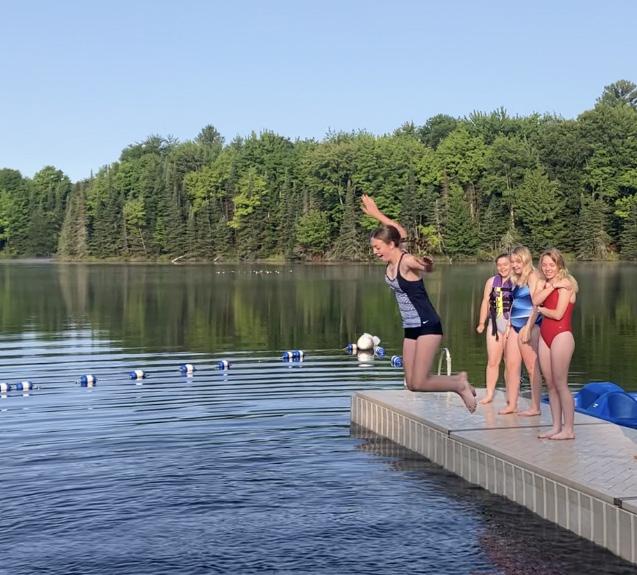
• If your troop is looking for more direct support, we have several council staff who are excited to help you plan your next Troop Adventure Trip.
• Council staff supporting your troop in this plan will not attend the trip with you. They provide advice to help you prepare and be ready for your trip.
• To get started:
• Email info@gsnwgl.org with the subject line: ‘Troop Adventure Trip’
• What are the dates of your trip?
• What is the location or destination of your trip?
• Who is attending? Please include Girl Scout members, their ages, their Girl Scout level, and the number of adults attending.
• Will your group need other certifications for this trip?
• Backcountry or front country?
• Backcountry camping is a style of camping that takes place in the wilderness free of most amenities. This form of camping requires participants to make way by foot, skis, snowshoes, or canoe/kayak to reach their desired campsite.
• Front country camping is a type of camping in which a camper drives to and parks in the campsite.
• What type of activities do you plan on doing?
• What type of equipment does your group have or will need for this trip?

• Keep up with Girl Scouts of the Northwestern Great Lakes on social media.
You can follow Girl Scouts of Northwestern Great Lakes on Facebook, Instagram, Pinterest, LinkedIn, and YouTube. Be sure to tag GSNWGL with your latest outdoor adventures!
• Connect with your service unit.
All Girl Scout families are part of a local geographical grouping of Girl Scouts called a service unit! Most service units have a volunteer leadership team made of volunteers who have been there and done that. Your service unit can help you find outdoor resources, connect you with training, and more. Contact your volunteer support specialist if you’re unsure which service unit you’re in.
• Submit your stories to the Girl Scouts of Northwestern Great Lakes.
We love to hear about your troop’s activities throughout the year. Submit your adventures at Tell Us Your Story. Your troop may inspire other troops to have an outdoor adventure!
